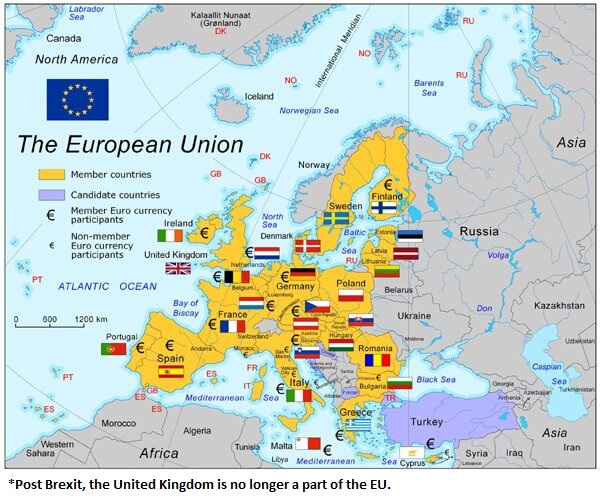International Relations
Significance of 15th India-European Union Summit
This article is based on “India should believe in the EU” which was published in The Hindu on 16/07/2020. This article discusses the importance of India's relationship with the EU in the wake of the recently held summit.
Recently, India-EU Virtual summit resumed after being halted for a couple of years. The European Union (EU) is a group of countries that operates as a cohesive economic and political block.
Europe’s perception of India has been changing in tandem with increasing tensions with China. In 2018, the EU released a new strategy for cooperation with India, calling it a geopolitical pillar in a multipolar Asia, crucial for maintaining the balance of power in the region. Paris and Brussels have been actively pushing Europe to see India as a truly strategic partner.
The EU and India can work together to promote peace, create jobs, boost economic growth and enhance sustainable development in the member countries.
Opportunities
- Potential gain from EU-India trade agreement: The potential impact of an EU-India trade agreement would significantly increase trade gains likely to flow to India.
- Additional potential gains from enhanced coordination on the provision of global public goods, such as environmental standards would help India to adopt Bharat VI standards more swiftly and meet its emission cut targets on time.
- Combating Covid crisis: Getting access to Covid tools’ of the EU and its countries, India’s pharma companies could collaborate with them in a global attempt in finding the cure of Covid. This partnership could help in:
- Enhancing global cooperation and solidarity to protect lives to mitigate the socio-economic consequences.
- Strengthening preparedness and response capacities.
- Security: The European Union Agency for Law Enforcement Cooperation or Europol and CBI are negotiating a working arrangement to support law enforcement authorities of EU member states and India to prevent and combat organised crime and terror.
- Combating Climate Change: India can learn from new industrial strategy called the Green Deal of EU to render its carbon-emission neutral by 2050
- The EU and India could endeavour transforming into carbon-neutral economies by 2050 by investing in clean energies. .
- European Atomic Energy Community (Euratom) and India signed for cooperation between the EU's research programmes on new ways of using nuclear energy to limit India’s dependency on fossil fuels.
- In India’s efforts to increase the use of renewable energy in India, the investment and technology of Europe is of paramount importance.
- Defence Cooperation: The two sides are also set to launch a high-level trade dialogue to address issues such as stalled negotiations on a maritime security dialogue, and develop security and defence consultations and military contacts.
- Countering China: EU can be a reliant partner for India to counter Chinese influence in its neighbourhood.
- The EU has its own connectivity strategy, providing around €414 billion in aid globally, and is already partnering with Japan and the United States (US) to provide alternatives to BRI. This can check China’s Belt and Road Initiative (BRI) investments and infrastructure connectivity.
- This is a crucial opportunity where the EU can deliver what India needs. Entities such as the European Investment Bank are active in India, investing in metro and other infrastructure projects.
- India should explore this partnership with the EU to not only fill domestic infrastructure needs but also as part of India’s neighbourhood diplomacy.
Challenges
- Pending Free Trade Deal: A free trade deal that India and the European Union have been pending since 2007. It was not concluded even in the 15th India-EU summit.
- At the end of the virtual summit, no official deadline for the free trade agreement was declared.
- Lopsided Investments: There is still room for improvement especially when compared to EU investments in China.
Way Forward
- Enhancing connectivity: Facilitating people’s mobility and connectivity to improve mutual understanding and create opportunities for innovation and growth.
- Geopolitical Balancing: In geopolitical terms partnership with the EU can help India balancing its powerful rivals.
- For eg: Indo-Pacific region is increasingly the focus of attention, so India should capitalise on its geopolitical leverage there.
- Maximising Strategic Cooperation: Even India’s strongest bilateral relations with individual EU member states do not come close to the potential of dealing effectively with the EU as a whole.
- The EU and India can join forces to promote sustainable reform like parity among nations in multilateral institutions including the World Trade Organization (WTO).
- India could maximise benefit from this strategic partnership. Stronger cooperation with democratic powers can support this effort, especially towards assertive competitors like China
- Greater Business Cooperation: The EU is India’s largest trading partner and the second-largest destination for Indian exports.
- As Europe looks to diversify supply chains and move away from China, India shouldn’t miss the opportunity to attract investments. It should deepen its relationship with the world’s largest trading bloc, which has already negotiated FTAs with Vietnam, Japan and Singapore.
Conclusion
India and the EU are natural partners. This partnership could enhance peace and stability in India and member countries of the EU. This reality has become even clearer in today’s global situation. However for this, India and the EU must adopt a long-term strategic perspective and an action-oriented agenda should be implemented within a stipulated time frame.
|
Drishti Mains Question The power of any aspiring global player depends on the number and quality of its bilateral and multilateral relationships. Discuss. |
This editorial is based on “State of deluge” that was published in The Indian Express on July 17th, 2020. Watch this on our Youtube channel now.





